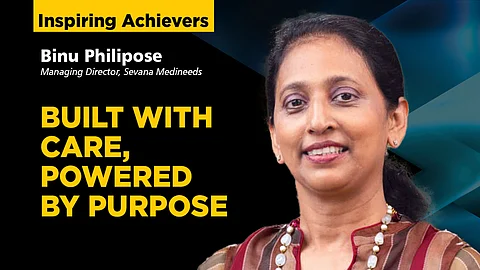

“For at the proper time we will reap a harvest if we do not give up.” – Galatians 6:9.
This Bible verse reflects the journey of Binu Philipose, the woman behind Suraksha—a trusted name in South India’s medical disposables sector. Calm, composed, and driven by a sense of purpose rather than profit, Binu has built a brand rooted in values, care, and quality.
Her journey began not with a grand business plan but with a deeply personal mission. In the early ’90s, her father, C. P. Philipose, an innovative electrical engineer, started a small catheter unit to support his paralysed friend and colleague, Rajan Paul. The idea gained traction when it turned out that catheters were not easily available in India, and the imported ones were expensive.
At 21, fresh out of her chemical engineering course, Binu was asked to head the unit. Though hesitant—especially about leading a venture that produced condom catheters—she eventually agreed, with the assurance that she could step away if it didn’t work out. That decision marked the beginning of Sevana Medineeds, with Binu working from a modest room in her father’s packaging unit in Kizhakkambalam.
Backed by a group of friends and her father’s belief in decentralised production, Binu adopted a model that allowed small production units to function independently sidestepping Kerala’s labour strike issues. Early on, she faced a crucial wake-up call when a hospital rejected a catheter batch due to leakage. It led her to implement rigorous quality control mechanisms, including using compressors, after guidance from the Rubber Board
Realising they couldn’t scale with just one product, Binu diversified. A key turning point came with examination gloves. Initially surplus stock from SEZ-based companies, Binu repackaged them smartly, introduced various sizes, and marketed them under the Suraksha brand.
At a time when most hospitals relied solely on surgical gloves, Suraksha’s examination gloves offered an essential extra layer of protection—quickly gaining popularity.
More products followed: surgical masks, gowns, caps, shoe covers, nebulisers, and suction units. The brand flourished. But Binu remained steadfast on quality—even as cheaper Chinese imports flooded the market and made certain products like wheelchairs and airbeds unviable for her to continue.
Early in her journey, Binu faced a tempting offer to supply catheters under another company’s label—a potentially profitable and low-risk option. But she refused. “If we gave up our name once, we’d lose the chance to ever build it,” she said. It was a pivotal decision that ensured Suraksha stood on its own merits.
Another major milestone came with the making of surgical masks. When Dr Sojan Iype of MOSC Medical College asked if she could supply them, Binu didn’t even know what material was used. But she set out to find it. After weeks of reaching out, she got a call from a Garware director, who admired her effort—sending her the non-woven fabric she needed. With this, she created prototypes and launched Suraksha masks. During the Covid pandemic, these became their most in-demand product, with sales skyrocketing and saving countless lives.
Marketing never relied on flash. Medical exhibitions, personal visits, and word-of-mouth served them well before digital platforms took over. What really built Suraksha’s name, however, was customer trust. “We listen,” Binu says. “That’s our biggest strength.”
Today, Suraksha is synonymous with reliability in South India’s healthcare sector. Binu continues to explore new products, even as she supports her daughter Liya Sara Peter’s boutique venture with the same passion for quality. Her son, Leo Peter, currently employed at an MNC, plans to join the family business.
“My fight was not just to build a brand,” Binu says. “It was to prove that even in the toughest of circumstances, you can rise. You don’t have to cut corners. You just need to believe—and never give up.”